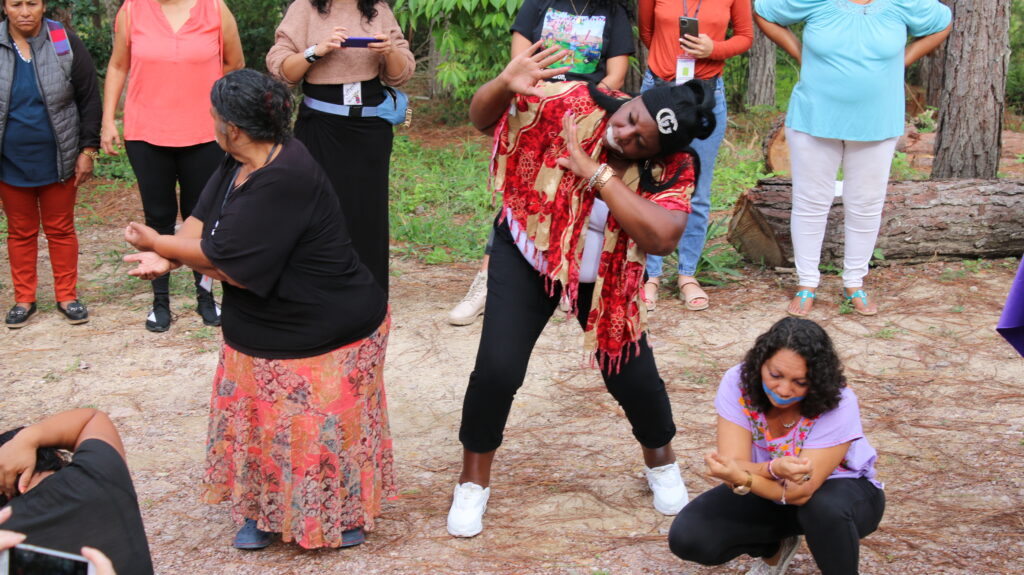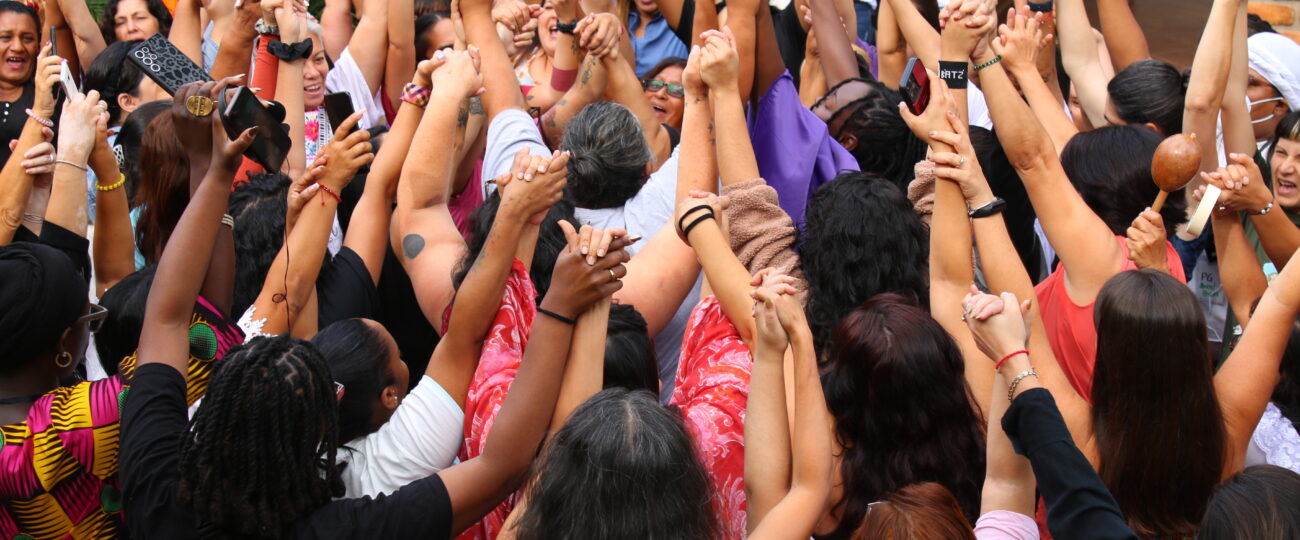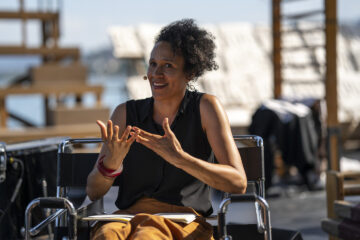There is a system of multiple domination that classifies identities and bodies. It identifies us as man or woman and defines heterosexuality as “normal,” while other dissident bodies and sexual identities are often not even named. This is the same system that categorizes us based on race and ethnicity, according to which white is superior. It also classifies us according to class, between rich and poor. It classifies us based on geopolitics, dividing us into North and South, and geographically, between urban and rural. It classifies us according to a number of other categories, including last name, identity, deficiency, name, origin, religion.
In this classification system, the entire upper segment—rich, white, heterosexual men from the urban areas and the global North—is usually made up of the owners of the means of production, who control the working dynamics of society, states, and laws. The poor are at the bottom: women, lesbians, Indigenous people, Black people, workers, from the global South and rural areas.
We have built identities from what the system itself imposes on us as categories, challenging the origins of this classification system and who is benefiting from naming us as such.
So Why Does Speaking About Our Bodies Matter?
Margarita Pisano argues that “the body is the instrument with which we play life.” It is the organ that provides us the vital connection with the rest of the cosmos, with nature. It is the energy that allows us to promote collective and personal change.
Sexuality is related to our desires, eroticism, pleasure in life, affection toward other people, attraction, likes and dislikes, what we see and what arouses us. Sexuality is how we express ourselves, our relationship with our bodies and how we share it with other people, in our experiences alone or with others.
Everything we experience as sexuality has been learned. The concept of beauty we have has been learned, as well as desire. We are always craving for perfection for our bodies and sometimes we believe we do not deserve to be loved because we don’t have the perfect body. Sexuality is related to how our subjectivity is constructed, as subjects that can be manipulated by this model.
It is important to reclaim our bodies to decolonize our minds, our imagination, and our pleasures. While the body is where oppression becomes rooted, it is also where we find the pathways toward emancipation and the transformation of our way of feeling. So we need to notice how much violence we absorb through the media; how many ugly emotions there are, including inside ourselves; how much authoritarianism, delegitimation, jealousy exists. Giving new meaning to what is bad for us also leads to processes of change to build different relationships.
Body and Sexuality in the Capital Accumulation Process
A colonial, capitalist, patriarchal social construct is the relationship between body and labor. The body is an anatomical-physiological unit, which means it breathes, chews, defecates, and is able to give birth, which is assigned to us as an obligation. From our bodies, we are exploited and traded.
Labor exploits the body’s physical capacity. Women, especially migrants, live under the mandate of bodies that are used to clean and care. This labor, according to Marxist feminists, is the human activity that transforms reality and what has also allowed civilizations to develop over the course of history. Next to it, there is also livelihood work outside the home, in a sexual division of labor. Moreover, some feminists also posit that there is a third labor: the mental load of thinking about and planning everything. Even when we are working outside our homes, we are always thinking, “we’re out of soap,” “we’re out of salt”… Women have everything planned: “I have to go that way, but before that I’ll stop by the grocery store, then I’ll go to the bank, then I’ll take the kids, then I’ll go wherever.”
Reproductive labor is established from the institution of romantic love, which is a way to control women’s subjectivity. We, women, do anything for love. They sell us the idea that we have to be loving, which actually means caring for others all the time while not caring for ourselves. We eat after everyone has eaten, if there is enough food.
All this labor is assigned to us and nevertheless we have to be grateful when we are loved. When we are little, they tell us, “You need to be well-behaved, because, otherwise, no one will like you.” These messages we constantly receive tell us that love is something that has to do with deserving, because we behave well, which means obeying to the mandate of all this invisible, unpaid labor of reproducing the species that sustains capital accumulation.
Mayan feminist historians have been talking about how the colony has established serfdom as the logic that allows capital to operate and accumulate. Colonization has historically assigned Indigenous and Black people—especially Indigenous and Black women—the responsibility to carry out all the work resulting from serfdom.
Material and Symbolic Institutions of Control Over Bodies and Sexualities
The capitalist model is responsible for rendering oppression natural and for the indoctrination of desire, with the imposition of specific likes. All this is so normalized that we don’t even question it anymore. In this sense, we often see prostitution or human trafficking as “something that happens,” without connecting it to our critical analysis or our proposals for change. The beauty industry, as well as the pharmaceutical industry, contributes to pathologize any imbalance or disorder we may have, and which is often a consequence of this very model. The war industry is built over the model of masculinity and domination.
In the body-labor relationship, there are degenerative effects on our health caused by new technologies. Sedentary lifestyles are greatly hurting us. Stress is one of these effects, as well as depressions and its self-injury practices. We are not able to follow our own paces anymore—we have to keep producing all the time. Another effect is pollution caused by production processes, which have impacts on our health. Many Indigenous communities are standing up for their territories against contamination with agrochemicals, against the appropriation of their rivers, and the installation of transmission towers, as well as against the sexual violence they endure for resisting.

Pathologization and Violence
There are religions and political pacts to pathologize and criminalize anything that disrupts the mandate of sexual homogenization. So any sexuality is pathologized as an excess, as a sin, or a deviation that must be repressed, controlled, or curbed, especially when it comes to women, who are burdened with men’s sexual control.
Churches, schools, the state, and the family regulate, monitor, criticize, and punish sexual behavior. Forbidding leads to the manipulation of desire, internalized hierarchies, and even some fantasies, about which we may wonder: how much do we internalize practices without knowing whether we like them or not?
Pathologization has been a strategy since colonial times, dehumanizing Indigenous peoples. Our bodies are turned into diseases, and they say, for example, that our blood is dirty. Based on that, they commodify false precepts, generating profits for capitalism.
Transfemicide is the result of the violence perpetrated by these institutions, especially religious institutions, which justify punishment or even death to impose compulsory heterosexuality. Through discipline and control mechanisms, patriarch renders heterosexuality natural, ensuring loyalty and an emotional and erotic view of women toward men. To maintain the heterosexual regime, homosexuality, lesbianism, and other sexual forms need to be banned or become taboos, so that heterosexuality can look like the only legitimate and natural possibility to have affectionate and sexual relationships.
Heteronormativity Is a Political Regime
In this regime, there is a sense of ownership over bodies, which is built based on principles as the already mentioned compulsory motherhood and female monogamy. The system classifies us according to the sexual access we give men or not—that is, our belonging to men makes us “good” or “bad.” Having bad and good women is a mechanism that serves this model and further deepens the longstanding rivalry between women.
Society controls, authorizes, or restricts, for its own benefit, the ways how we reproduce and procreate, according to market needs, whether by banning abortion or imposing mass sterilization on some peoples. Sexual dissidents are those who are, to a greater extent, living their sexualities under precarious conditions. This means the heterosexual regime is limited, because many people dare to live their lives differently, even if precariously.
Without compulsory heterosexuality, the system cannot maintain women imprisoned to exploit them. Without exploiting women, it cannot keep men as the symbolic center of the productive world. And without this domination, it cannot devastate nature, produce, trade, and accumulate surplus value.
To conceive emancipatory processes, we must conduct a situated analysis, understanding that we are diverse and plural, and that we are inserted in contexts and stories that create currents and hierarchies. This collective reflection is an emotional process, which aims to improve the complexity of how we ask questions based on our feelings. With that, this analysis shows how important it is to bring back and reclaim our bodies in political terms, in camaraderie with others, to create an emancipatory political force.
María Dolores Marroquín is a member of the Political Alliance Women’s Sector (Alianza Política Sector Mujeres) and the World March of Women Guatemala. This is an edited version of her speech at the International Feminist Organizing School delivered in August 2023 in Honduras.




